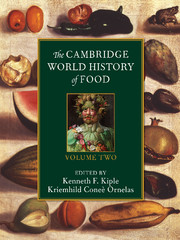Book contents
- Frontmatter
- Part V Food and Drink around the World
- Part VI History, Nutrition, and Health
- Part VII Contemporary Food-Related Policy Issues
- VII.1 The State, Health, and Nutrition
- VII.2 Food Entitlements
- VII.3 Food Subsidies and Interventions for Infant and Child Nutrition
- VII.4 Recommended Dietary Allowances and Dietary Guidance
- VII.5 Food Labeling
- VII.6 Food Lobbies and U.S. Dietary Guidance Policy
- VII.7 Food Biotechnology: Politics and Policy Implications
- VII.8 Food Safety and Biotechnology
- VII.9 Food Additives
- VII.10 Substitute Foods and Ingredients
- VII.11 Nonfoods as Dietary Supplements
- VII.12 Food Toxins and Poisons from Microorganisms
- VII.13 The Question of Paleolithic Nutrition and Modern Health: From the End to the Beginning
- Part VIII A Dictionary of the World’s Plant Foods
- Name Index
- Subject Index
- References
VII.13 - The Question of Paleolithic Nutrition and Modern Health: From the End to the Beginning
from Part VII - Contemporary Food-Related Policy Issues
Published online by Cambridge University Press: 28 March 2008
- Frontmatter
- Part V Food and Drink around the World
- Part VI History, Nutrition, and Health
- Part VII Contemporary Food-Related Policy Issues
- VII.1 The State, Health, and Nutrition
- VII.2 Food Entitlements
- VII.3 Food Subsidies and Interventions for Infant and Child Nutrition
- VII.4 Recommended Dietary Allowances and Dietary Guidance
- VII.5 Food Labeling
- VII.6 Food Lobbies and U.S. Dietary Guidance Policy
- VII.7 Food Biotechnology: Politics and Policy Implications
- VII.8 Food Safety and Biotechnology
- VII.9 Food Additives
- VII.10 Substitute Foods and Ingredients
- VII.11 Nonfoods as Dietary Supplements
- VII.12 Food Toxins and Poisons from Microorganisms
- VII.13 The Question of Paleolithic Nutrition and Modern Health: From the End to the Beginning
- Part VIII A Dictionary of the World’s Plant Foods
- Name Index
- Subject Index
- References
Summary
A conviction has been growing among some observers that contemporary human health could be substantially improved if we would just emulate our hunter–gatherer ancestors in dietary matters. A look at this contention seems an appropriate way to bring this work to a close because the subject takes us full circle – linking contemporary issues of food and nutrition with our Paleolithic past. In addition, it offers an opportunity for some summary, and, finally, it provides a chance to remind ourselves of how ephemeral food and nutritional dogma can be.
In fact, in retrospect we call such fleeting tenets “Food Fads” (see the treatment by Jeffrey M. Pilcher, this work chapter VI.12), and in the United States at least, it was not very long ago that vitamin E capsules were being wistfully washed down in the hope of jump-starting sluggish libidos (Benedek, this work chapter VI.15). Not long before that, the egg was enshrined as the “perfect” food, with milk in second place, and cholesterol, now an apparently significant ingredient in the gooey deposits that plug heart arteries, was not a word in everyday vocabularies (Tannahill 1989).
In those “B.C.” (before cholesterol) days, meat was in, and the starchy foods (potatoes, breads, and pastas), although full of fiber, were out – considered bad for a person’s waistline and health, not to mention social standing. Garlic had a similarly dismal reputation – only foreigners ate it – and only winos drank wine. Who could have foreseen then that we would soon toss all of that nutritional lore that guided us into the ash heap of history and embrace its polar opposite – the “Mediterranean Diet” (Keys and Keys 1975; Spiller 1991; see also Marion Nestle, chapter V.C.1).
- Type
- Chapter
- Information
- The Cambridge World History of Food , pp. 1704 - 1709Publisher: Cambridge University PressPrint publication year: 2000
References
- 5
- Cited by



